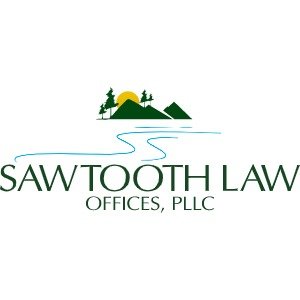Best Property Insurance Lawyers in Twin Falls
Share your needs with us, get contacted by law firms.
Free. Takes 2 min.
List of the best lawyers in Twin Falls, United States
About Property Insurance Law in Twin Falls, United States
Property insurance in Twin Falls, United States, protects individuals and businesses from financial losses due to damage or destruction of property. This legal field encompasses various types of insurance policies, including homeowners, renters, flood, and commercial property insurance. Insurers provide coverage for incidents such as theft, fire, vandalism, and some natural disasters. Understanding the nuances of property insurance law is essential to ensure adequate coverage and compliance with policy terms and local regulations.
Why You May Need a Lawyer
While many property insurance claims are straightforward, several situations might necessitate legal assistance. Common scenarios include disputes over claim denials, disagreements about the extent of coverage, and issues regarding inadequate compensation received from insurers. A lawyer can help interpret policy language, negotiate with insurance companies, and represent your interests in court if necessary. Legal assistance is particularly beneficial in complex cases like fraud allegations or claims involving extensive property damage.
Local Laws Overview
Twin Falls, being part of Idaho, operates under state-specific regulations for property insurance. The Idaho Department of Insurance oversees these regulations and ensures that insurance providers operate fairly. Key aspects of local laws relevant to property insurance include requirements for claim handling, the insurer's duty to act in good faith, and the stipulations regarding policy cancellations and renewals. Familiarity with these norms aids policyholders in understanding their rights and responsibilities, while also helping to avoid common pitfalls.
Frequently Asked Questions
1. What types of property insurance are available in Twin Falls?
Homeowners, renters, flood, and commercial property insurance are the primary types available, each covering different risks and property types.
2. Is flood damage covered by a standard homeowners policy?
No, standard homeowners insurance does not typically cover flood damage. Separate flood insurance is often required.
3. How can I dispute a denied insurance claim?
If a claim is denied, you can request a detailed explanation from your insurer, gather necessary documentation, and consider seeking legal advice to appeal the decision.
4. What is the role of the Idaho Department of Insurance?
The Idaho Department of Insurance regulates insurers, ensuring policyholder protection and fair treatment across the state.
5. Can my insurance company cancel my policy at any time?
Policies can be canceled by insurers under certain conditions, such as non-payment of premiums, but must comply with state notification requirements.
6. How do I choose the right property insurance policy?
Consider factors such as coverage needs, policy limits, deductibles, and the financial stability of the insurer when selecting a policy.
7. What should I do immediately after property damage occurs?
Document the damage, contact your insurance provider promptly, and follow their instructions for claim reporting and assessment.
8. Are there penalties for late premium payments?
Yes, late payments might result in penalties, loss of coverage, or cancellation, so timely payment is crucial.
9. How does a deductible work in property insurance?
A deductible is the amount you pay out of pocket before the insurance kicks in. Higher deductibles typically result in lower premiums.
10. Is legal assistance necessary for all insurance claims?
Not necessarily. Simple claims might be resolved without legal help, but complex or disputed claims may benefit from legal expertise.
Additional Resources
For further assistance, consider contacting the Idaho Department of Insurance for information about regulations and complaints. Additionally, the Twin Falls Bar Association can provide referrals to property insurance lawyers. National organizations like the National Association of Insurance Commissioners (NAIC) offer resources and consumer guides.
Next Steps
If you discover a need for legal assistance in property insurance matters, start by gathering all relevant documentation including your insurance policy, correspondence with your insurer, and evidence of the loss or damage. Consult with a legal expert specializing in property insurance law to discuss your situation and explore your options. A lawyer can provide invaluable insights and represent your best interests throughout the claim process or legal proceedings.
Lawzana helps you find the best lawyers and law firms in Twin Falls through a curated and pre-screened list of qualified legal professionals. Our platform offers rankings and detailed profiles of attorneys and law firms, allowing you to compare based on practice areas, including Property Insurance, experience, and client feedback.
Each profile includes a description of the firm's areas of practice, client reviews, team members and partners, year of establishment, spoken languages, office locations, contact information, social media presence, and any published articles or resources. Most firms on our platform speak English and are experienced in both local and international legal matters.
Get a quote from top-rated law firms in Twin Falls, United States — quickly, securely, and without unnecessary hassle.
Disclaimer:
The information provided on this page is for general informational purposes only and does not constitute legal advice. While we strive to ensure the accuracy and relevance of the content, legal information may change over time, and interpretations of the law can vary. You should always consult with a qualified legal professional for advice specific to your situation.
We disclaim all liability for actions taken or not taken based on the content of this page. If you believe any information is incorrect or outdated, please contact us, and we will review and update it where appropriate.








